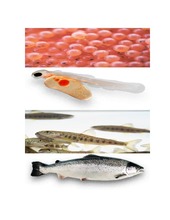Salmon economic analysis: an operational cost study, finding better ways to ensure efficient resource utilization, improves profitability and environmental sustainability for the salmon aquaculture in Norway.
Master thesis
Permanent lenke
https://hdl.handle.net/1956/20636Utgivelsesdato
2018-12-20Metadata
Vis full innførselSamlinger
- Department of Geography [634]
Sammendrag
Salmon aquaculture is the fastest growing industry in Norway, contributing to food security and nutrition. The industry ensures social, economic and environmentally sustainable development by utilizing natural resources efficiently. However, this industry consistently encounters challenges; idle capacity, pollution, diseases, parasites and fish escaping, to name a few. The considerably longer production cycle is largely responsible for brewing these challenges. Moreover, these limitations have elevated the concern about the significant economic losses and ecological impacts. With the current technologies, under current regulatory and ecological conditions, despite increasing salmon demand in the global market, room for industrial growth is constrained. This has led to an increase of a significant attention in the area of new technology development and new ways for sustainable expansion. A number of variables determine profitability in aquaculture, including capacity utilization, biological factors, capital investment, operational costs and sales price. Many of the actual outcomes in the aquaculture rely on the efficient usage of MTB (Maximum Total Biomass) limit, which is considered the most scarce and expensive resource for a fish farm production. The current study has undertaken economic analysis to assess the MTB utilization and cost of production in the current production model of a traditional sea-based salmon farm situated in Sognefjorden. The report aims to investigate how the current MTB limit is utilized and how time, information and uncertainty can create incentives or difficulties for improving MTB usage during the “post-smolt” production phase. A shorter production cycle possibly improves production capacity utilization and production turnover to ensures “economies of scale”. Thus, production time is reduced, adopting policies like introducing larger smolt compared to the regular smolt and optimal harvesting weight class. Hence, the shorter production cycle ensures efficient resource utilization, reduce vulnerabilities, higher production volume, lower production costs and improve profitability.
Utgiver
The University of BergenOpphavsrett
Copyright the Author. All rights reservedBeslektede innførsler
Viser innførsler beslektet ved tittel, forfatter og emneord.
-
Gene expression analyses of immune responses in Atlantic salmon during early stages of infection by salmon louse (Lepeophtheirus salmonis) revealed bi-phasic responses coinciding with the copepod-chalimus transition
Tadiso, Tariku Markos; Krasnov, Aleksei; Skugor, Stanko; Afanasyev, Sergey; Hordvik, Ivar; Nilsen, Frank (Peer reviewed; Journal article, 2011-03-07)The salmon louse (Lepeophtheirus salmonis Krøyer), an ectoparasitic copepod with a complex life cycle causes significant losses in salmon aquaculture. Pesticide treatments against the parasite raise environmental concerns ... -
Surface environment modification in Atlantic salmon sea-cages: Effects on amoebic gill disease, salmon lice, growth and welfare
Wright, Daniel William; Geitung, Lena; Karlsbakk, Egil; Stien, Lars Helge; Dempster, Timothy David; Oldham, Tina; Nola, Velimir; Oppedal, Frode (Peer reviewed; Journal article, 2018)Surface environment modification is a potential parasite control strategy in Atlantic salmon sea-cage farming. For instance, a temporary low salinity surface layer in commercial-scale snorkel sea-cages has coincided with ... -
Infectious salmon anaemia in Atlantic salmon, Salmo salar L. in Chile – transmission routes and prevention
Vike, Siri (Doctoral thesis, 2014-08-29)Infectious salmon anaemia (ISA) virus causes a severe, commercially significant disease in all countries farming Atlantic salmon (Salmo salar). This thesis examines the ISA epizootic in Chile during 2007-09, known as the ...
